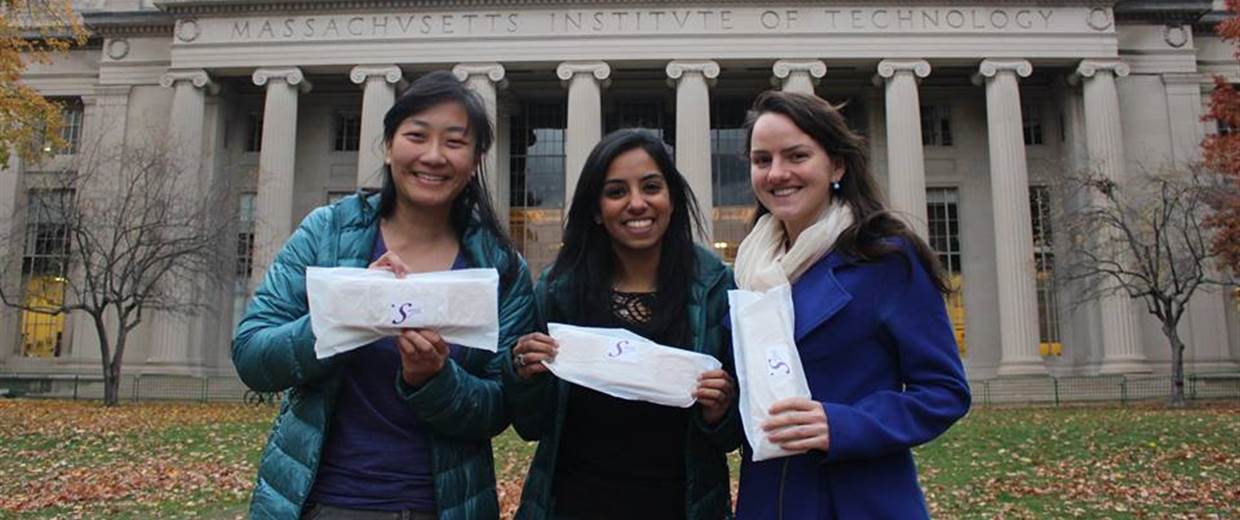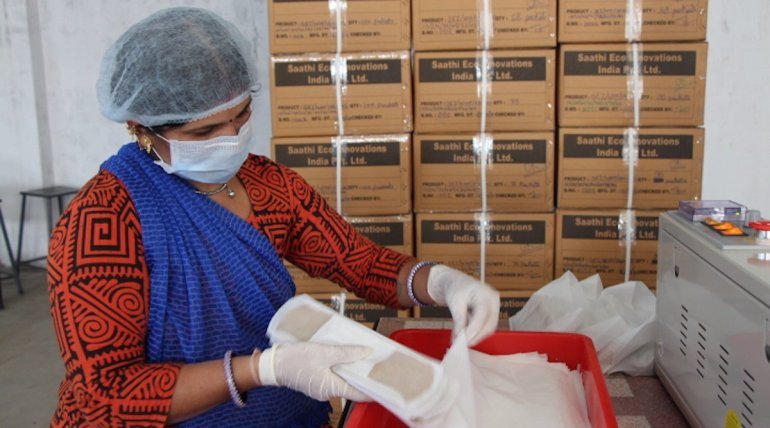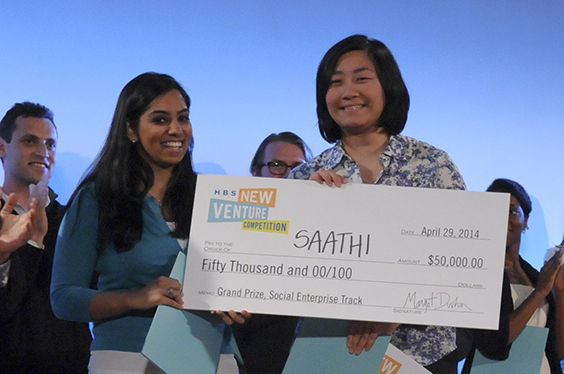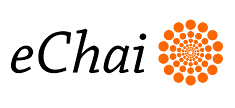Saathipads: Biodegradable sanitary pads made from banana fibre.
What is Saathipads?
Saathi is a women-led manufacturing company that makes eco-friendly hygiene products. Saathi is one of the leading sanitary pad manufacturers who makes 100% biodegradable sanitary napkins in India.
Founded by graduates from MIT (US) and Nirma, we are innovators in the use of alternative materials and zero-waste production. Our mission is to create hygiene products that are good for the body, environment, and community.
Tell us more about your team ?
Our women-led team are MIT and Nirma graduates and have experience in a number of functions across product design, manufacturing, NGO management, and business development. In total, we have 17 full-time employees and 4 part-time employees. In the near future, we are expanding our team to include three additional engineers and two marketing/sales persons:
Kristin Kagetsu, co-founder/CEO: MIT grad. Has previous experience working for a NGO in Uttarakhand to design another all-natural product: crayons. She developed a manufacturing process, which utilized natural pigments leftover from textile dyeing.
Amrita Saigal, co-founder/CFO: Graduate of Harvard Business School and has worked for Google and McKinsey. From her previous work experience, she has an in-depth understanding of M&E and finance. She also previously worked for Proctor & Gamble to distribute sanitary pads in rural India.
Tarun Bothra, co-founder/CTO: Holds a BS in mechanical engineering and manages product development/production.
Grace Kane, co-founder/CTO: Graduate of MIT and has worked with Oceaneering and Philips. Co-founded Saathipads and took the company from benchtop prototypes to scaled manufacturing and first sales.

How did you come up with the idea ?
The government and private institutions are encouraging women to adopt sanitary pads in place of cloth without regard to the health and environmental impact of conventional pads. The government developed menstrual hygiene guidelines that advocated for eco-friendly products, but simultaneously slashed import duties on the principal raw materials for plastic pads.
Meanwhile, prices for compostable materials remain high due to lower demand and an absence of subsidies. Packaging standards do not require companies to disclose the materials in the pads, and worse, companies often use misleading language like “cotton-y” to describe what is a blend of synthetic fibres and plastic. Common side effects of the chemicals and plastic used in the pads are skin irritation and vaginal rashes.
Nearly all eco-friendly pads in India are imported and none have reached mass market due to inaccessible pricing and limited distribution. Social campaigns to combat the use of plastic pads and their problematic disposal, led by dissatisfied consumers and waste picker collectives, have reached limited numbers.
Public discourse is limited because menstruation is highly stigmatized. The consequence is 355 million women who are being encouraged to use products shrouded in secrecy, and will result in 1,000,000 tons of waste annually.
Saathi pads are focused on both women’s menstrual hygiene and environment. The pads degrade within the span of 6 months and helps the society from plastic waste.
What problem are you solving ?
Saathi has developed the world’s first 100% biodegradable and compostable sanitary pads made from waste banana tree fiber.
Lack of access to sanitary pads is a critical women’s rights issue: it is a leading reason for higher school dropout rates of girls than boys, results in lost income from days off work, and is one of the main causes of UTIs and other infections. However, if every woman in India started using disposable sanitary napkins, it would cause an environmental crisis. Commercial pads contain toxic chemicals which are released into the environment when disposed of, and clog waterways or collect in landfills without breaking down. Saathi believes that we do not have to compromise between the health of women and the health of the environment.
With only 16% of Indian women using sanitary pads (the rest use old rags, mud and bark), a staggering 108,000 tons of sanitary pad waste is created annually– enough to cover a landfill spread over 24 hectares. The Indian government is determined to increase sanitary pad usage given that the lack of access to affordable sanitary pads is the leading reason for higher dropout rates of school aged girls as compared to boys. As more women become aware about proper feminine hygiene practices and especially as more women in rural areas start using pads, sanitary pad waste will increase drastically.
In many parts of India, women do not have the proper means to dispose of sanitary pads. This lack of reliable disposal systems causes many women to either bury or burn their sanitary pads. Burning pads exposes women themselves and their environments to toxic chemicals from plastics/additives in the pad. In the cases where disposal systems exist, pads are put into landfills, in which they will sit for over 800 years. It is estimated that the average women generates 120-150kg of sanitary pad waste in her lifetime. This is not a trivial amount, so looking to the future as sanitary pad usage is increased in India, access to affordable, biodegradable, non-toxic pads is essential.
Conventional sanitary pads are made of primarily plastic and chlorine-bleached wood pulp, which causes some women skin irritation and rashes, and is harmful for the environment upon disposal. Women in India currently generate 150,000 tons of sanitary pad waste each year. Waste generation and usage rates are rising as government-schemes reduce prices and provide greater access for low-income women in rural areas. Incompatible waste management systems in rural areas lead to sanitary pad waste being burned, buried and dug up by animals or thrown into waterways. The difficulty of disposal of plastic pads decreases the technology adoption rate.
How does it work ?

Saathi earns revenue through product sales through our online store and direct to NGOs. Since we began sales in January 2017, we have sold 50,000 pads, and generated $30,000 in revenue. Within the next nine months, we will ramp up our production capacity 50x and begin retail distribution.
As mandated by the Indian government standard for sanitary pads, the pads must undergo four tests: absorbency, ability to withstand pressure after absorption, disposability and pH value.
We conducted tests with over 1,500 women on the design, use and price of our product. Design testing asked women to share their preferences on the length and shape of the pad. This helped us decide the length and shape of our first product SKU. Use testing solicited women to try the pads for 3-7 days and provide feedback on its comfort, absorbency and other features. This helped us determine the best raw material suppliers and manufacturing methods.
There are three key performance parameters for our product: comfort, absorbency and compostability. While comfort is a subjective measure determined by the pad thickness, softness of the top layer and efficacy of absorbency, we aim to provide users 6 hours of comfort under normal flow conditions. The absorbency of our product must surpass the BIS rated standard of 30 ml. Our testing has demonstrated our absorbency is rated 40-50 ml. In order to upcycle the waste, the pad must be compostable. By definition, the pad should degrade in compost settings within six months.
What is your target market ?
Our main target market is middle and upper-class women in their 20's and 30's who have sensitive skin and are environmentally conscious. A large proportion of women report skin irritation problems with the market leading products. For women who are eco-conscious, there are no other biodegradable sanitary pad companies present in the urban Indian market. In the Indian market, there are very few organic or eco-friendly sanitary pads available and all are at a higher price than Saathi pads.
NGOs are our secondary target market. We dedicate 30% of our sales to NGOs, who receive a subsidy funded by our urban sales. The NGOs buy Saathi pads and can choose to resell them or provide them free of cost to users. An increasing number of NGOs are incorporating sanitary pad distribution schemes into their women’s wellness and empowerment programs, but there are very few biodegradable, natural options. We choose to sell to NGOs rather that users in rural and urban slum areas directly to simplify distribution.
What is your competitive advantage ?
Saathi’s patent-pending banana fiber processing technology creates pads that are more sustainable than plastic or cotton pads. Women in India currently generate 150,000 tons of sanitary pad waste each year, and stand to produce 1,000,000 tons as pad adoption rates rise. Saathi pads not only eliminate that pad waste, but also reduce agricultural waste. Banana fiber is grown with 6x less water and 10x less fertilizer than cotton, and comes from a part of the banana tree that was traditionally discarded after harvest. Our technology converts banana fiber into an ultra-soft material whose absorbency matches the conventionally used bleached wood pulp and surpasses cotton.
Saathi’s innovative business model increases low-income women’s access to pads. Currently, 80% of women in India cannot access pads. By committing 30% of sales to NGOs at a subsidized price, we aim to provide compostable pads to 100,000 low-income women by 2020.
Despite industry myths, women are very willing to migrate to new products that better fulfill their needs: comfort, absorbency and cost. Replacing wood pulp and cotton with more sustainably grown natural fibres can be more absorbent and cost-effective, and creates a compelling narrative for today’s conscious consumers. Our first product, pads made from banana fibre, are priced more competitively than most cotton-based pads and have greater absorbency; our absorbency matches plastic pads without the use of bleach, chemicals or synthetic fibres.
Saathi does all local sourcing and manufacturing and is the only sanitary pad company to consider the entire lifecycle of the product from sourcing to disposal. Saathi will be able to bring a compostable product mass-market that is accessible to women across income levels and benefits the local economy.
How much time did it take you from conceptualization of 'your venture' to actually launching it in the market ?
We started developing our technology in 2010 at MIT. Since then, we have gone through 5 versions of our machine and 9 tested prototypes of our product. Initially, we were focused on decentralized manufacturing, where we envisioned putting a machine in every village.
Since moving to India in 2014, we have been focused on making sanitary pads that are entirely biodegradable and compostable. After many rounds of user feedback, we realized managing quality during decentralized manufacturing would be very difficult at this stage and the need for 100% biodegradable pad was necessary given that many women were hesitant use pads due to the waste created.
To date, we have completed 5 rounds of consumer testing with over 500 women. We have also tested the compostability and biodegradability of our pads using a selection of common composting methods.
How do you plan to market your product? What are your customer acquisition strategies ?
Presently, India is our prime focus. At Saathi, we believe in the word of mouth. We work hard in order to provide the best quality to the customers. Hence, if you satisfy customers with products that are best for their body and environment, than you won’t have to worry about the rest.
Apart from this, we actively participate in conference and events in order to get in touch with more people and to pass our message to a large number of audience.
What is the revenue model ?
Saathi earns revenue through pad sales. In the urban market, Saathi pads will be distributed online and in retail shops at list price.
Our online sales channels will consist of our own website, major online marketplaces (Amazon, Flipkart) and small eco-oriented online stores.
Our retail sales channels will consist of hypermarkets, pharmacies and eco-oriented retailers. We engage with potential customers through online marketing, beauty bloggers, and our key press contacts who to date have given us millions of eyes of free coverage.
In the NGO market, Saathi pads will be sold at a subsidized rate.
What do you want to achieve from this? What is your larger goal or vision ?

Our mission is to create biodegradable pads that are good for the body, environment, and community. Our sales in the urban market fund a 75% subsidy for NGOs who distribute pads in rural and urban slum communities. Banana farmers earn additional by selling an agricultural byproduct that they previously discarded. Saathi is proud to locally source and manufacture our biodegradable pads to create employment opportunities and support the local ecosystem of green material suppliers.
As part of our scale up plan to reach 300,000 women each month, we will create a new brand. The new brand will have the following characteristics:
● International appeal. Since we plan to export, we want an easy, English name that conveys a universally understood theme.
● Quality focused. Saathi’s original target market was rural women. Since there was so much press coverage built around our original business plan, many people have a misconception about who we serve. Now that we have expanded our target market, we would like to retain the Saathi brand for our NGO customers and launch a new brand for urban, individual customers. Our upgraded machinery will also provide a product quality upgrade, which we would like to celebrate with our new brand.
Great branding is important to establish ourselves in a competitive market, and the social payoff is huge. For every 100,000 women who buy Saathi pads at retail price, 43,000 low-income and rural women gain access. At our target to capture a 1% market share in India by 2020, we will supply at least 344,000 low-income and rural women with biodegradable pads annually.
What sort of support and feedback are you looking from the community ?
We are most in need of capital to scale our manufacturing. By scaling out manufacturing we can lower our production costs and expand our reach from thousands to hundreds of thousands of consumers. So far we have raised $225,000 of the $1,575,000 we plan to raise to support our growth during the next two years. Our major spending items are fully automated pad machinery, factory setup-related costs, and marketing.
We hope to gain visibility and access to fellow manufacturing entrepreneurs and investors. Manufacturing is one of the more lonely paths of social enterprise and we derive immense value from linking with other manufacturing companies, like EarthEnable. We also are looking for investors who are familiar with investing in social enterprises, and may have a particular interest in Asia or India.

Share feedback Or Ask questions Or Discuss
Dhruv Gupta
A researcher turned entrepreneur, a computer scientist by certificate and a design thinker by training who did his first startup at 18. He has built 3 (three) tech startups till now and has been part of the journey for many startups as consultant, mentor and investor.
@saathipads - As you had already sold 50,000+ pads by now, what are the surprising trends you had seen in your sales figures..??
Jatin Chaudhary
Salesman @eChaiVentures l Good at managing WhatsApp groups n organizing high quality, large gatherings at low cost :-) l Observer l Fmr Global Shaper @WEF
@Kristin - How did you build your team? What's your hiring strategy?
Law Fleeter Adv Shivangi
Plz contact me if you want fund 8850373717
Kashi Financial
CA Bharatkumar Koshti : He is the Qualified Chartered Accountant from India , having an extensive experience in the field of Auditing , Accounting and Financial Services. He had worked for the many corporate (Public and Private) based in India and Dubai for the Auditing Services during his career, after considering the vast experience with various corporate services at domestic and globally he started his own advisory and consultancy services firm of Kashi Financial Services.
Feel free to contact us for the fund raising and strategic advisory services in pan India and UAE.
Saili Parab
I am an Entrepreneur who loves to build stories for businesses. I believe that when a business has a story linked to their products or services, people feel more connected to the business. I would love to help businesses who want to get connected to their customers and want to be remembered by them. I am sure that your business to brand journey with me would be a worth one.
Hey Saathi team,
Loved your product idea and the story of Saathi.
I would be more than happy if I could help you in telling your story to more and more people out there. That is through your Branding.
If that sounds something of interest to you, please feel free to contact me.